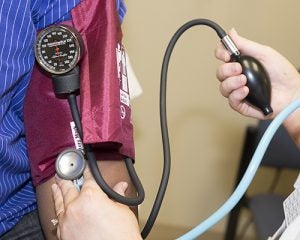REDUCING THE RISK
Researchers tackle high blood pressure, health disparities in rural South
East Carolina University researchers are part of a multi-institutional team receiving a large grant to tackle health disparities related to uncontrolled high blood pressure in the rural South.
Boosted by an award of nearly $9.5 million, investigators at ECU’s Brody School of Medicine will spend the next five years partnering with colleagues at the University of North Carolina at Chapel Hill and the University of Alabama at Birmingham to compare different strategies for reducing high blood pressure, or hypertension, among low-income African-Americans in the rural southeastern United States.
The project is funded by the Patient-Centered Outcomes Research Institute in partnership with the National Institutes of Health, the nation’s primary medical research agency.
It aims to improve blood pressure in the nation’s “Black Belt” – the arc-shaped region stretching from eastern Texas to Maryland – and to address the “triple threat” of risk factors that increase the chances someone will suffer poor health outcomes: rural residency, minority status and low socio-economic status.

(Photo by Gretchen Baugh)
“Individuals characterized by these three risks are among those at the highest risk nationally of experiencing serious health problems associated with uncontrolled hypertension – like heart disease and stroke,” said Dr. Doyle “Skip” Cummings, a professor of family medicine and public health at Brody who’s overseeing ECU’s arm of the study.
Nearly one in three American adults has high blood pressure, according to the Centers for Disease Control and Prevention, and the prevalence increases with age. Rural residents are more likely to be diagnosed with heart disease than urban dwellers. And African-Americans are nearly twice as likely to die from preventable heart disease and stroke as Caucasians.
According to the N.C. State Center for Health Statistics, 38.9 percent of adults in eastern North Carolina reported being told by a doctor that they had hypertension. Even more alarming was the 46.6 percent of African-American respondents in the East who reported having hypertension – a rate approximately 25 percent higher than that reported by white respondents.
“Few previous studies have targeted these high-risk populations exclusively,” Cummings said. “They also haven’t fully engaged patients and clinicians in addressing this problem, which could be key to achieving real progress.”
In this new study, ECU researchers will compare two strategies – separately and combined – for supporting hypertensive patients: telephone-based peer coaching and practice facilitation.
Peer coaching aims to address the ingrained mistrust of health care systems that’s common across some Black Belt communities by helping patients and providers learn how to build positive relationships with one another.
Practice facilitation is a customized approach that helps clinical practices develop structural changes or techniques to enhance the quality of care they provide and to increase patient and staff satisfaction. For example, staff might offer specific forms of positive reinforcement to patients who independently manage their hypertension well.
“The first thing we’ll do is hold patient and provider focus groups to determine how this study would fit into practices and how to best engage this population of patients,” Cummings said. “Our goal for the first year is to learn from patients and providers what they think will work best. Then we’ll begin linking patients with community supports that can help, like community health workers and faith-based organizations.”
There will be a 4-year implementation phase, with the long-term goal of finalizing practice facilitation and peer coaching interventions that can be scaled up throughout the entire Black Belt region across a wide variety of practices.
Researchers plan to recruit about 2,000 patient participants across 80 practices in Alabama and North Carolina. Cummings said ECU’s participation will be administered through the Eastern Carolina Association for Research and Education (E-CARE) and the ECU Center for Health Disparities.
Sponsored jointly by Brody’s Department of Family Medicine and Vidant Medical Group, E-CARE is a nationally recognized, primary care practice-based research network made up of 30 community-based practices across the state, most in the rural East.
Brody researchers were awarded $1.67 million for their participation in the project, which will also be supported by staff from the Eastern Area Health Education Center. Other Brody faculty members involved are Dr. Hope Landrine, director of the ECU Center for Health Disparities; Dr. Stephanie Jilcott Pitts, associate professor in the Department of Public Health; Dr. Chelley Alexander, chair of ECU’s family medicine department; and Alyssa Adams, research specialist in family medicine.
“Even as health outcomes associated with blood pressure control have improved nationwide, striking disparities remain among racial and ethnic minorities, low-income individuals, and rural residents,” said Dr. Romana Hasnain-Wynia, director of PCORI’s Addressing Disparities Program. “This suggests serious problems that remain to be solved.”
Patients or health care providers who’d like more information about participating in the study should call 252-744-2607.
